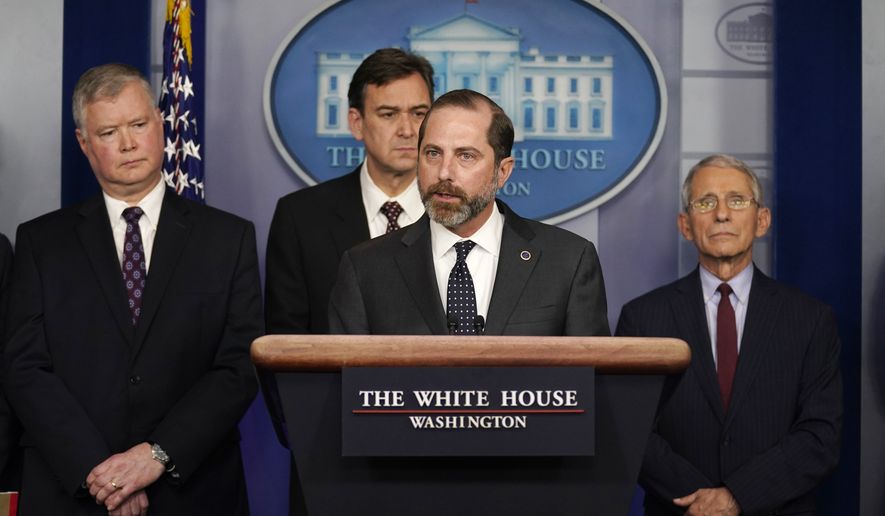The Trump administration is taking more drastic steps to prevent the novel coronavirus from spreading in the U.S., denying entry to the U.S. among foreign nationals who’ve traveled in China and pose a transmission risk.
There will be exceptions for immediate family of U.S. citizens and permanent residents.
Health Secretary Alex Azar also said Friday that U.S. citizens who’ve been in Hubei province — the epicenter of the “Wuhan” virus — within the last 14 days will be quarantined for 14 days in the U.S. It will be at a designated quarantine facility.
He said those returning from the rest of mainland China will be subject to “proactive health screening” at select ports of entry and then monitored under “self-quarantine” at home for 14 days.
All flights from China will be funneled through airports in New York, Chicago, San Francisco, Seattle, Atlanta, Honolulu and Los Angeles, officials said.
Mr. Azar outlined the measures as part of a public health emergency that will take effect at 5 p.m. on Sunday. Officials stressed the measures will be temporary, as they grapple with the “unknowns” around the disease.
So far, the coronavirus has killed over 200 people amid 9,700 in China. There have been 132 cases reported in 23 other countries.
The coronavirus can cause severe pneumonia, acute respiratory distress and organ failure.
It was discovered in December and traced back to a market that sold live animals in Wuhan, a city of 11 million located about halfway between Beijing and Hong Kong.
President Trump has projected confidence the situation is under control. U.S. authorities have reported seven cases, including one case of human-to-human transmission in Chicago. The latest case, reported late Friday, involves a person in California who recently traveled from Wuhan.
“This is a serious health situation in China, but I want to emphasize the risk to the American public currently is low,” said Robert Redfield, director of the Centers for Disease Control and Prevention. “Our goal is to do all we can do to keep it that way.”
The World Health Organization recently declared the epidemic a global health emergency, elevating the crisis and opening the door to worldwide collaboration and funding to combat the disease.
The State Department warned Americans not to travel to China, though some Republicans in Congress want the U.S. to go further and impose a travel ban on flights to and from the Asian nation.
An average of more than 14,000 people traveled from China to the U.S. on any given day in fiscal 2019, via direct or indirect flights, according to Mr. Trump’s proclamation banning entry to certain foreigners.
“The United States government is unable to effectively evaluate and monitor all of the travelers continuing to arrive from China,” the proclamation says. “The potential for widespread transmission of the virus by infected individuals seeking to enter the United States threatens the security of our transportation system and infrastructure and the national security.”
Delta Air Lines and American Airlines are suspending all flights between the U.S. and China.
“There is no travel ban,” acting Assistant Transportation Undersecretary Joel Szabat said.
Federal officials said 195 American repatriated from Wuhan, China — the virus’s origin city — will be under quarantine for two weeks at a military base in California.
• Tom Howell Jr. can be reached at thowell@washingtontimes.com.




Please read our comment policy before commenting.